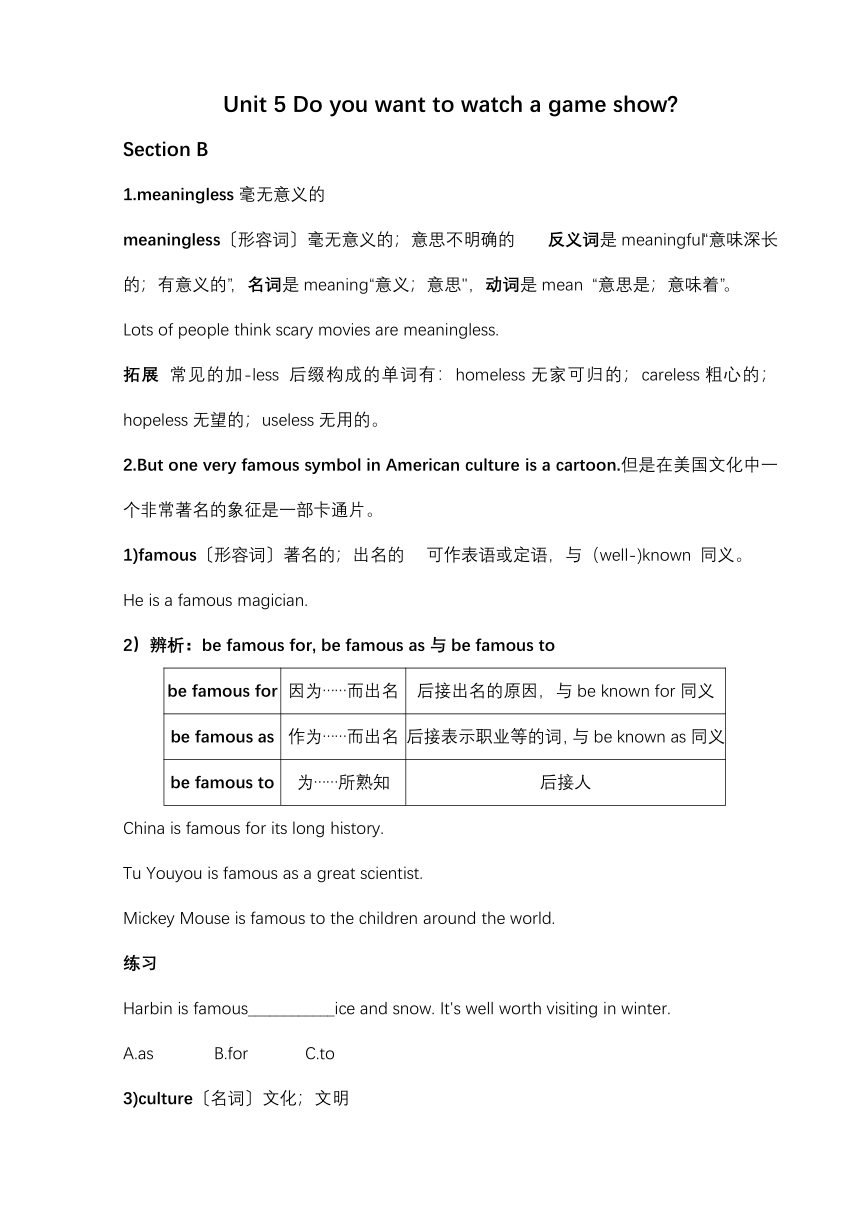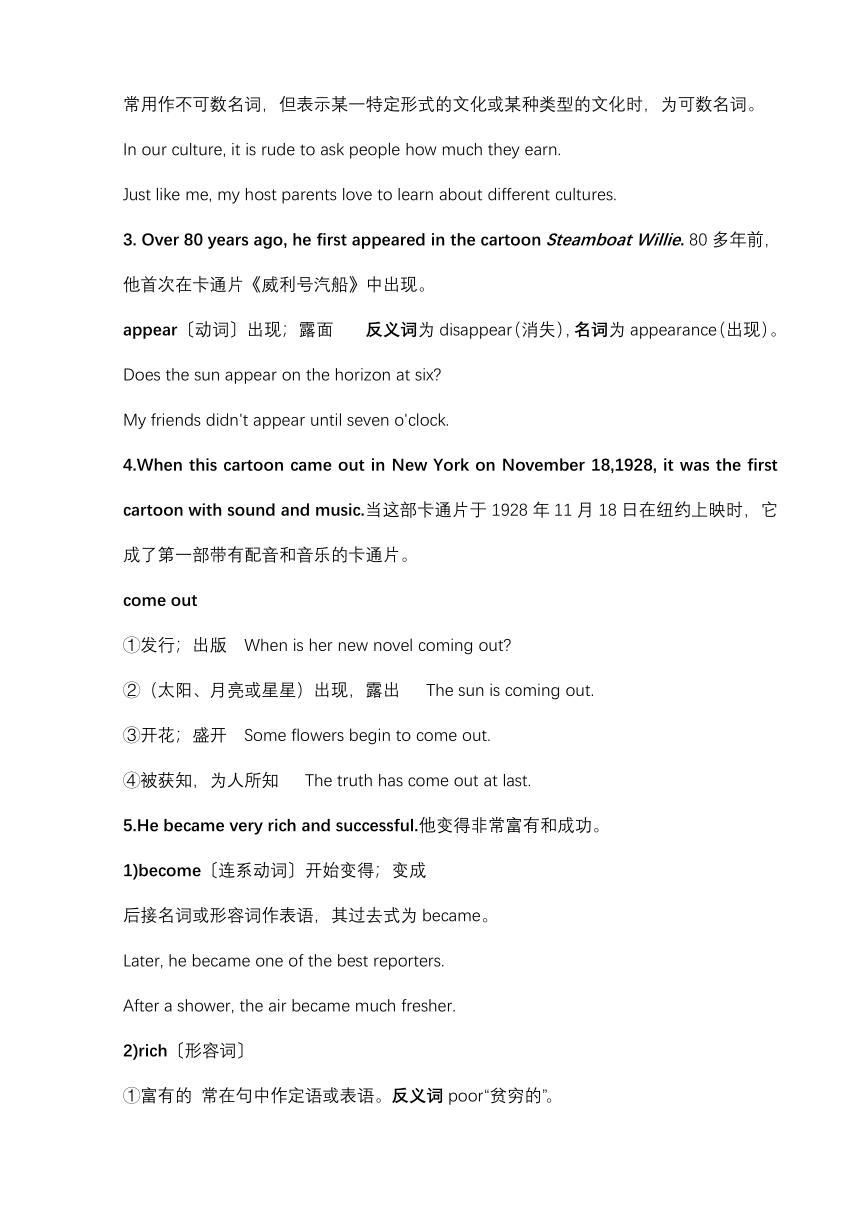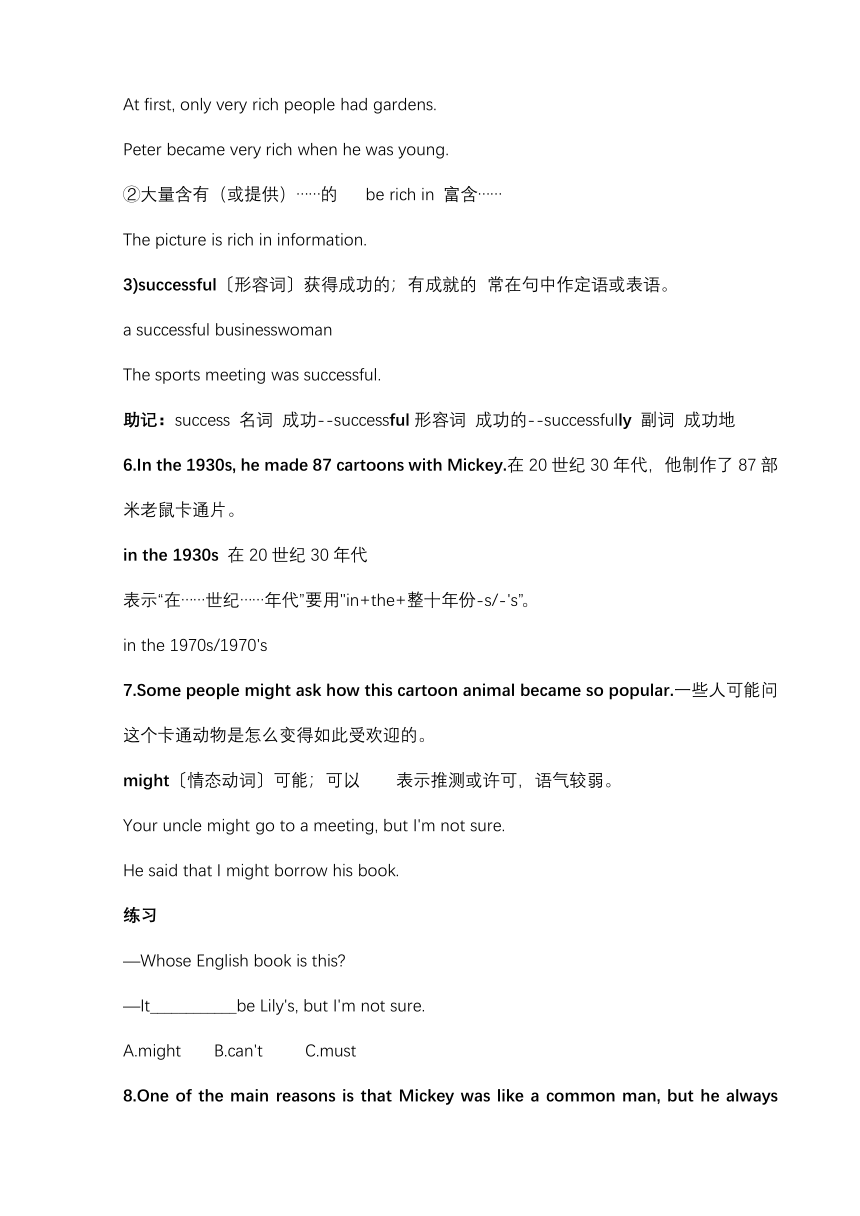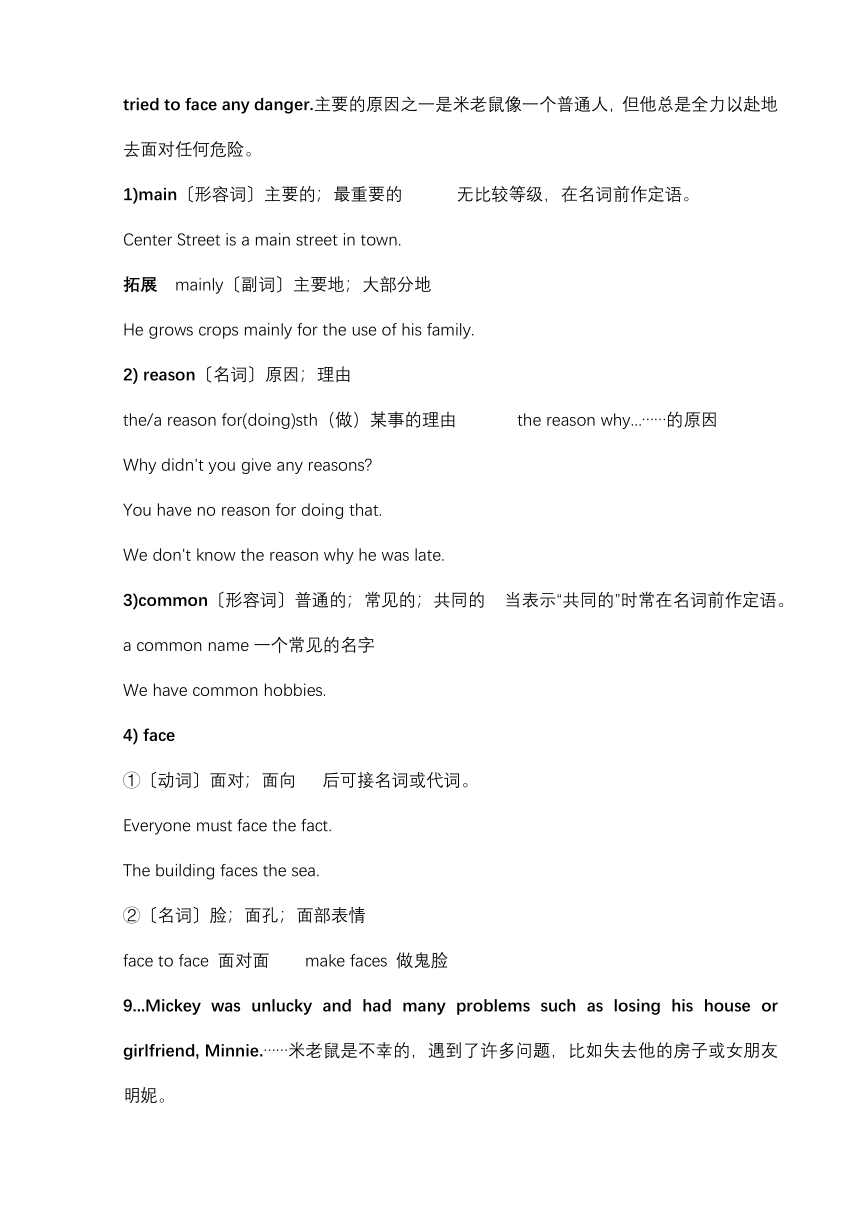Unit 5 Do you want to watch a game show? SectionB 知识点学案
文档属性
| 名称 | Unit 5 Do you want to watch a game show? SectionB 知识点学案 |  | |
| 格式 | docx | ||
| 文件大小 | 141.3KB | ||
| 资源类型 | 教案 | ||
| 版本资源 | 人教新目标(Go for it)版 | ||
| 科目 | 英语 | ||
| 更新时间 | 2023-07-09 21:50:01 | ||
图片预览





文档简介
Unit 5 Do you want to watch a game show
Section B
1.meaningless毫无意义的
meaningless〔形容词〕毫无意义的;意思不明确的 反义词是meaningful“意味深长的;有意义的”,名词是meaning“意义;意思",动词是mean “意思是;意味着”。
Lots of people think scary movies are meaningless.
拓展 常见的加-less 后缀构成的单词有:homeless无家可归的;careless粗心的;hopeless无望的;useless无用的。
2.But one very famous symbol in American culture is a cartoon.但是在美国文化中一个非常著名的象征是一部卡通片。
1)famous〔形容词〕著名的;出名的 可作表语或定语,与(well-)known 同义。
He is a famous magician.
2)辨析:be famous for, be famous as与be famous to
be famous for 因为……而出名 后接出名的原因,与be known for同义
be famous as 作为……而出名 后接表示职业等的词,与be known as同义
be famous to 为……所熟知 后接人
China is famous for its long history.
Tu Youyou is famous as a great scientist.
Mickey Mouse is famous to the children around the world.
练习
Harbin is famous____________ice and snow. It's well worth visiting in winter.
A.as B.for C.to
3)culture〔名词〕文化;文明
常用作不可数名词,但表示某一特定形式的文化或某种类型的文化时,为可数名词。
In our culture, it is rude to ask people how much they earn.
Just like me, my host parents love to learn about different cultures.
3. Over 80 years ago, he first appeared in the cartoon Steamboat Willie. 80多年前,他首次在卡通片《威利号汽船》中出现。
appear〔动词〕出现;露面 反义词为disappear(消失),名词为appearance(出现)。
Does the sun appear on the horizon at six
My friends didn't appear until seven o'clock.
4.When this cartoon came out in New York on November 18,1928, it was the first cartoon with sound and music.当这部卡通片于1928年11月18日在纽约上映时,它成了第一部带有配音和音乐的卡通片。
come out
①发行;出版 When is her new novel coming out
②(太阳、月亮或星星)出现,露出 The sun is coming out.
③开花;盛开 Some flowers begin to come out.
④被获知,为人所知 The truth has come out at last.
5.He became very rich and successful.他变得非常富有和成功。
1)become〔连系动词〕开始变得;变成
后接名词或形容词作表语,其过去式为became。
Later, he became one of the best reporters.
After a shower, the air became much fresher.
2)rich〔形容词〕
①富有的 常在句中作定语或表语。反义词poor“贫穷的”。
At first, only very rich people had gardens.
Peter became very rich when he was young.
②大量含有(或提供)……的 be rich in 富含……
The picture is rich in information.
3)successful〔形容词〕获得成功的;有成就的 常在句中作定语或表语。
a successful businesswoman
The sports meeting was successful.
助记:success 名词 成功--successful形容词 成功的--successfully 副词 成功地
6.In the 1930s, he made 87 cartoons with Mickey.在20世纪30年代,他制作了87部米老鼠卡通片。
in the 1930s 在20世纪30年代
表示“在……世纪……年代”要用"in+the+整十年份-s/-'s”。
in the 1970s/1970's
7.Some people might ask how this cartoon animal became so popular.一些人可能问这个卡通动物是怎么变得如此受欢迎的。
might〔情态动词〕可能;可以 表示推测或许可,语气较弱。
Your uncle might go to a meeting, but I'm not sure.
He said that I might borrow his book.
练习
—Whose English book is this
—It____________be Lily's, but I'm not sure.
A.might B.can't C.must
8.One of the main reasons is that Mickey was like a common man, but he always tried to face any danger.主要的原因之一是米老鼠像一个普通人,但他总是全力以赴地去面对任何危险。
1)main〔形容词〕主要的;最重要的 无比较等级,在名词前作定语。
Center Street is a main street in town.
拓展 mainly〔副词〕主要地;大部分地
He grows crops mainly for the use of his family.
2) reason〔名词〕原因;理由
the/a reason for(doing)sth(做)某事的理由 the reason why...……的原因
Why didn't you give any reasons
You have no reason for doing that.
We don't know the reason why he was late.
3)common〔形容词〕普通的;常见的;共同的 当表示“共同的”时常在名词前作定语。
a common name一个常见的名字
We have common hobbies.
4) face
①〔动词〕面对;面向 后可接名词或代词。
Everyone must face the fact.
The building faces the sea.
②〔名词〕脸;面孔;面部表情
face to face 面对面 make faces 做鬼脸
9...Mickey was unlucky and had many problems such as losing his house or girlfriend, Minnie.……米老鼠是不幸的,遇到了许多问题,比如失去他的房子或女朋友明妮。
1)unlucky〔形容词〕不幸的;不吉利的 常在句中作表语或定语。
反义词为lucky(幸运的);副词形式为unluckily (不幸地)。
He was unlucky enough to miss the last train.
The crow is an unlucky animal in Chinese culture.
助记
2)lose〔动词〕
①失去;丢失 过去式为lost。
指因事故或过失失去原有的东西,也可指人专心于某事。
Did you lose anything
Tom lost himself in reading.
②输 反义词是win (获胜;赢)。
They lost the game because of carelessness.
拓展 lose one's way 迷路 lose weight减肥 lose interest in 对……失去兴趣
lose heart失去信心 lose oneself in沉迷于……;全神贯注于……
10.However, he was always ready to try his best.然而,他总是准备好尽其所能。
1) be ready to do sth. 准备好做某事;愿意做某事
其中ready用作形容词,意为“愿意的;准备好的”。
Everything is packed, and we're ready to leave.
Now, you can see Chinese people are always ready to help you.
拓展 be ready for sth.为……做好准备(表示状态)
get ready for sth.为……做好准备(表示动作)
We are ready for the exam.
2)try one's best 尽力;竭尽全力 与do one's best同义。
try/do one's best to do sth.某人尽力做某事
Tom is trying/doing his best to win the competition.
11.Today's cartoons are usually not so simple as little Mickey Mouse...现在的卡通片通常不再像小米老鼠那样简单……
simple〔形容词〕简单的;易做的 同义词是easy,反义词是hard/difficult。
live a simple life过着简朴的生活 a simple question 一个简单的问题
12. She dresses up like a boy and takes her father's place to fight in the army. 她打扮成男孩模样替父从军打仗。
1) dress up
①装扮;乔装打扮 dress up like/as+人 装扮成某人(的样子)
Girls like dressing up like/as princesses.
②着特殊服装;穿上盛装
dress up in+衣服 穿……来打扮
Miss Jones dressed up for this party.
Do you dress up in costumes on some important festivals
拓展 dress〔动词〕(给……)穿衣服 宾语通常为表示“人”的名词或代词。
She dressed her children in their best clothes.
2)take sb.'s place 代替;替换
I had to go out, so Jane took my place at the meeting.
拓展 take the place of 代替 No one can take the place of a mother.
13...they did a good job in the movie.……他们在影片中都演得很好。
do a good job 干得好 相当于do well, 用于夸奖某人的工作或表现。
She did a good job in the talent show.
知识梳理
用法集萃
1.mind(sb/sb.'s)doing sth.介意(某人)做某事
2.can't stand(doing)sth.无法忍受(做)某事
3.plan to do sth.计划/打算做某事 be ready to do sth.准备好/愿意做某事
try/do one's best to do sth.某人尽力做某事
4.see sb.do sth.看见某人做了/经常做某事 see sb.doing sth.看见某人正在做某事
5.hope to do sth.希望做某事 hope+that从句 希望……
6.expect to do sth.期待/预料做某事 expect sb.to do sth.期待/预料某人做某事
expect+that从句 预计…… 7.be successful in doing sth.成功做某事
8. Sth. + happen(s) to sb.某人发生了某事。 Sb. + happen(s) to do sth.某人碰巧做某事。
9.sb.be always ready to do sth.某人总是准备好/愿意做某事
语法专项
动词不定式作宾语
动词不定式是一种非谓语动词形式,其结构为“to+动词原形”,其中to不是介词,而是动词不定式的符号,称为小品词。动词不定式没有人称和数的变化,在句子中可以作主语、表语、宾语、补足语、定语或状语等。今天我们重点学习后接动词不定式作宾语的常见动词(短语)。
用法 例句
want,hope,wish,decide,agree,choose,would like,plan,fail等动词(短语)后接动词不定式作宾语 I decided to go to the countryside for vacation.
know,ask,show,teach,decide,find out等动词(短语)后可用“疑问词+动词不定式"结构作宾语 Please teach me how to play the piano.
like,begin,start等动词后既可以接动词不定式,也可以接动名词形式,意义上差别不大 I like singing, but I don't like to sing now.
"find/think/feel+it+形容词+动词不定式" 结构,其中it为形式宾语,动词不定式为真正的宾语 I find it difficult to learn English.
拓展 stop,forget, remember,try等动词后面既可以接动词不定式,也可以接动名词形式,但意义上有差别。
stop to do sth.停下(正在做的事)去做某事 stop doing sth.停止做某事
I'm tired. Let's stop to have a rest.
It's time for class. Stop talking.
forget to do sth.忘记要做某事(事情未做)
forget doing sth.忘记做过某事(事情已做)
Don't forget to turn off the light when you leave the room.
I forgot telling you that before.
remember to do sth.记得去做某事(事情未做)
remember doing sth.记得做过某事(事情已做)
We must remember to turn off the TV.
I remembered sending you some stamps.
try to do sth.尽力做某事 try doing sth.尝试做某事
He tried to control his voice.
He decided to try living in the countryside for a while.
助记 常跟动词不定式作宾语的动词:
需要拒绝莫忘记 (need,refuse,forget); 想要学习就努力 (want,learn,try)
希望帮助并同意 (hope/wish,help,agree);喜欢决定后开始(like,decide,begin/start)。
练习
—I often watch talk shows on TV.
—I enjoy watching the news. I hope____________what's going on around the world.
A.find out B. to find out C.finding out
语法专练
1. Mary wants____________a TV reporter in the future.
A.to B.to be C.to is D.to do
2. What do you expect____________from the book
A.learn B.learning C.to learn D.learns
3. We stopped____________,but heard nothing.
A.to listen B.listens C.listen D.listening
4. Both my friend and I decide____________something for the old lady who lives alone.
A.doing B.to do C.done D.do
5. They didn't plan____________to London for their holiday.
A.to go B.going C.gone D.went
6. The Great Wall is so famous that a large number of travellers wish____________it.
A.visit B.visiting C.to visit D.visited
Section B
1.meaningless毫无意义的
meaningless〔形容词〕毫无意义的;意思不明确的 反义词是meaningful“意味深长的;有意义的”,名词是meaning“意义;意思",动词是mean “意思是;意味着”。
Lots of people think scary movies are meaningless.
拓展 常见的加-less 后缀构成的单词有:homeless无家可归的;careless粗心的;hopeless无望的;useless无用的。
2.But one very famous symbol in American culture is a cartoon.但是在美国文化中一个非常著名的象征是一部卡通片。
1)famous〔形容词〕著名的;出名的 可作表语或定语,与(well-)known 同义。
He is a famous magician.
2)辨析:be famous for, be famous as与be famous to
be famous for 因为……而出名 后接出名的原因,与be known for同义
be famous as 作为……而出名 后接表示职业等的词,与be known as同义
be famous to 为……所熟知 后接人
China is famous for its long history.
Tu Youyou is famous as a great scientist.
Mickey Mouse is famous to the children around the world.
练习
Harbin is famous____________ice and snow. It's well worth visiting in winter.
A.as B.for C.to
3)culture〔名词〕文化;文明
常用作不可数名词,但表示某一特定形式的文化或某种类型的文化时,为可数名词。
In our culture, it is rude to ask people how much they earn.
Just like me, my host parents love to learn about different cultures.
3. Over 80 years ago, he first appeared in the cartoon Steamboat Willie. 80多年前,他首次在卡通片《威利号汽船》中出现。
appear〔动词〕出现;露面 反义词为disappear(消失),名词为appearance(出现)。
Does the sun appear on the horizon at six
My friends didn't appear until seven o'clock.
4.When this cartoon came out in New York on November 18,1928, it was the first cartoon with sound and music.当这部卡通片于1928年11月18日在纽约上映时,它成了第一部带有配音和音乐的卡通片。
come out
①发行;出版 When is her new novel coming out
②(太阳、月亮或星星)出现,露出 The sun is coming out.
③开花;盛开 Some flowers begin to come out.
④被获知,为人所知 The truth has come out at last.
5.He became very rich and successful.他变得非常富有和成功。
1)become〔连系动词〕开始变得;变成
后接名词或形容词作表语,其过去式为became。
Later, he became one of the best reporters.
After a shower, the air became much fresher.
2)rich〔形容词〕
①富有的 常在句中作定语或表语。反义词poor“贫穷的”。
At first, only very rich people had gardens.
Peter became very rich when he was young.
②大量含有(或提供)……的 be rich in 富含……
The picture is rich in information.
3)successful〔形容词〕获得成功的;有成就的 常在句中作定语或表语。
a successful businesswoman
The sports meeting was successful.
助记:success 名词 成功--successful形容词 成功的--successfully 副词 成功地
6.In the 1930s, he made 87 cartoons with Mickey.在20世纪30年代,他制作了87部米老鼠卡通片。
in the 1930s 在20世纪30年代
表示“在……世纪……年代”要用"in+the+整十年份-s/-'s”。
in the 1970s/1970's
7.Some people might ask how this cartoon animal became so popular.一些人可能问这个卡通动物是怎么变得如此受欢迎的。
might〔情态动词〕可能;可以 表示推测或许可,语气较弱。
Your uncle might go to a meeting, but I'm not sure.
He said that I might borrow his book.
练习
—Whose English book is this
—It____________be Lily's, but I'm not sure.
A.might B.can't C.must
8.One of the main reasons is that Mickey was like a common man, but he always tried to face any danger.主要的原因之一是米老鼠像一个普通人,但他总是全力以赴地去面对任何危险。
1)main〔形容词〕主要的;最重要的 无比较等级,在名词前作定语。
Center Street is a main street in town.
拓展 mainly〔副词〕主要地;大部分地
He grows crops mainly for the use of his family.
2) reason〔名词〕原因;理由
the/a reason for(doing)sth(做)某事的理由 the reason why...……的原因
Why didn't you give any reasons
You have no reason for doing that.
We don't know the reason why he was late.
3)common〔形容词〕普通的;常见的;共同的 当表示“共同的”时常在名词前作定语。
a common name一个常见的名字
We have common hobbies.
4) face
①〔动词〕面对;面向 后可接名词或代词。
Everyone must face the fact.
The building faces the sea.
②〔名词〕脸;面孔;面部表情
face to face 面对面 make faces 做鬼脸
9...Mickey was unlucky and had many problems such as losing his house or girlfriend, Minnie.……米老鼠是不幸的,遇到了许多问题,比如失去他的房子或女朋友明妮。
1)unlucky〔形容词〕不幸的;不吉利的 常在句中作表语或定语。
反义词为lucky(幸运的);副词形式为unluckily (不幸地)。
He was unlucky enough to miss the last train.
The crow is an unlucky animal in Chinese culture.
助记
2)lose〔动词〕
①失去;丢失 过去式为lost。
指因事故或过失失去原有的东西,也可指人专心于某事。
Did you lose anything
Tom lost himself in reading.
②输 反义词是win (获胜;赢)。
They lost the game because of carelessness.
拓展 lose one's way 迷路 lose weight减肥 lose interest in 对……失去兴趣
lose heart失去信心 lose oneself in沉迷于……;全神贯注于……
10.However, he was always ready to try his best.然而,他总是准备好尽其所能。
1) be ready to do sth. 准备好做某事;愿意做某事
其中ready用作形容词,意为“愿意的;准备好的”。
Everything is packed, and we're ready to leave.
Now, you can see Chinese people are always ready to help you.
拓展 be ready for sth.为……做好准备(表示状态)
get ready for sth.为……做好准备(表示动作)
We are ready for the exam.
2)try one's best 尽力;竭尽全力 与do one's best同义。
try/do one's best to do sth.某人尽力做某事
Tom is trying/doing his best to win the competition.
11.Today's cartoons are usually not so simple as little Mickey Mouse...现在的卡通片通常不再像小米老鼠那样简单……
simple〔形容词〕简单的;易做的 同义词是easy,反义词是hard/difficult。
live a simple life过着简朴的生活 a simple question 一个简单的问题
12. She dresses up like a boy and takes her father's place to fight in the army. 她打扮成男孩模样替父从军打仗。
1) dress up
①装扮;乔装打扮 dress up like/as+人 装扮成某人(的样子)
Girls like dressing up like/as princesses.
②着特殊服装;穿上盛装
dress up in+衣服 穿……来打扮
Miss Jones dressed up for this party.
Do you dress up in costumes on some important festivals
拓展 dress〔动词〕(给……)穿衣服 宾语通常为表示“人”的名词或代词。
She dressed her children in their best clothes.
2)take sb.'s place 代替;替换
I had to go out, so Jane took my place at the meeting.
拓展 take the place of 代替 No one can take the place of a mother.
13...they did a good job in the movie.……他们在影片中都演得很好。
do a good job 干得好 相当于do well, 用于夸奖某人的工作或表现。
She did a good job in the talent show.
知识梳理
用法集萃
1.mind(sb/sb.'s)doing sth.介意(某人)做某事
2.can't stand(doing)sth.无法忍受(做)某事
3.plan to do sth.计划/打算做某事 be ready to do sth.准备好/愿意做某事
try/do one's best to do sth.某人尽力做某事
4.see sb.do sth.看见某人做了/经常做某事 see sb.doing sth.看见某人正在做某事
5.hope to do sth.希望做某事 hope+that从句 希望……
6.expect to do sth.期待/预料做某事 expect sb.to do sth.期待/预料某人做某事
expect+that从句 预计…… 7.be successful in doing sth.成功做某事
8. Sth. + happen(s) to sb.某人发生了某事。 Sb. + happen(s) to do sth.某人碰巧做某事。
9.sb.be always ready to do sth.某人总是准备好/愿意做某事
语法专项
动词不定式作宾语
动词不定式是一种非谓语动词形式,其结构为“to+动词原形”,其中to不是介词,而是动词不定式的符号,称为小品词。动词不定式没有人称和数的变化,在句子中可以作主语、表语、宾语、补足语、定语或状语等。今天我们重点学习后接动词不定式作宾语的常见动词(短语)。
用法 例句
want,hope,wish,decide,agree,choose,would like,plan,fail等动词(短语)后接动词不定式作宾语 I decided to go to the countryside for vacation.
know,ask,show,teach,decide,find out等动词(短语)后可用“疑问词+动词不定式"结构作宾语 Please teach me how to play the piano.
like,begin,start等动词后既可以接动词不定式,也可以接动名词形式,意义上差别不大 I like singing, but I don't like to sing now.
"find/think/feel+it+形容词+动词不定式" 结构,其中it为形式宾语,动词不定式为真正的宾语 I find it difficult to learn English.
拓展 stop,forget, remember,try等动词后面既可以接动词不定式,也可以接动名词形式,但意义上有差别。
stop to do sth.停下(正在做的事)去做某事 stop doing sth.停止做某事
I'm tired. Let's stop to have a rest.
It's time for class. Stop talking.
forget to do sth.忘记要做某事(事情未做)
forget doing sth.忘记做过某事(事情已做)
Don't forget to turn off the light when you leave the room.
I forgot telling you that before.
remember to do sth.记得去做某事(事情未做)
remember doing sth.记得做过某事(事情已做)
We must remember to turn off the TV.
I remembered sending you some stamps.
try to do sth.尽力做某事 try doing sth.尝试做某事
He tried to control his voice.
He decided to try living in the countryside for a while.
助记 常跟动词不定式作宾语的动词:
需要拒绝莫忘记 (need,refuse,forget); 想要学习就努力 (want,learn,try)
希望帮助并同意 (hope/wish,help,agree);喜欢决定后开始(like,decide,begin/start)。
练习
—I often watch talk shows on TV.
—I enjoy watching the news. I hope____________what's going on around the world.
A.find out B. to find out C.finding out
语法专练
1. Mary wants____________a TV reporter in the future.
A.to B.to be C.to is D.to do
2. What do you expect____________from the book
A.learn B.learning C.to learn D.learns
3. We stopped____________,but heard nothing.
A.to listen B.listens C.listen D.listening
4. Both my friend and I decide____________something for the old lady who lives alone.
A.doing B.to do C.done D.do
5. They didn't plan____________to London for their holiday.
A.to go B.going C.gone D.went
6. The Great Wall is so famous that a large number of travellers wish____________it.
A.visit B.visiting C.to visit D.visited
同课章节目录
- Unit 1 Where did you go on vacation?
- Section A
- Section B
- Unit 2 How often do you exercise?
- Section A
- Section B
- Unit 3 I'm more outgoing than my sister.
- Section A
- Section B
- Unit 4 What's the best movie theater?
- Section A
- Section B
- Unit 5 Do you want to watch a game show?
- Section A
- Section B
- Unit 6 I'm going to study computer science.
- Section A
- Section B
- Unit 7 Will people have robots?
- Section A
- Section B
- Unit 8 How do you make a banana milk shake?
- Section A
- Section B
- Unit 9 Can you come to my party?
- Section A
- Section B
- Unit 10 If you go to the party, you'll have a grea
- Section A
- Section B
